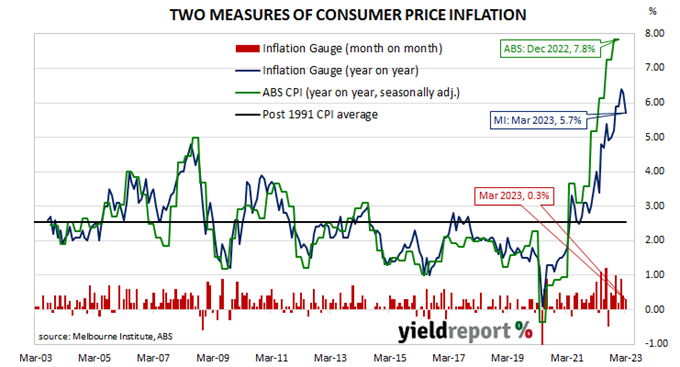Summary: Melbourne Institute Inflation Gauge index up 0.3% in March; up 5.7% on annual basis; ACGB yields up; rate cut expectations soften; implies 0.1% increase in March quarter CPI.
The Melbourne Institute’s Inflation Gauge is an attempt to replicate the ABS consumer price index (CPI) on a monthly basis. It has turned out to be a reliable leading indicator of the CPI, although there are periods in which the Inflation Gauge and the CPI have diverged for as long as twelve months. On average, the Inflation Gauge’s annual rate tends to overestimate the ABS rate by around 0.1%, at least until recently.
The Melbourne Institute’s latest reading of its Inflation Gauge index indicates consumer prices increased by 0.3% in March, following increases of 0.4% and 0.9% in February and January. The index rose by 5.7% on an annual basis, down from February’s figure of 6.3%.
Commonwealth Government bond yields increased on the day, ignoring movements in US Treasury yields on Friday night. By the close of business, the 3-year ACGB yield had gained 4bps to 2.95%, the 10-year yield had added 2bps to 3.32% while the 20-year yield finished 1bp higher at 3.74%.
In the cash futures market, expectations regarding future rate cuts softened. At the end of the day, contracts implied the cash rate would rise from the current rate of 3.57% to average 3.60% in April and then increase to an average of 3.655% through May. August 2023 contracts implied a 3.585% average cash rate while November 2023 contracts implied 3.495%, 7bps below the current cash rate.
Given the Inflation Gauge’s tendency to overestimate, the latest figures imply an official CPI reading of just 0.1% (seasonally adjusted) for the March quarter or 5.6% in annual terms. However, it is worth noting the annual CPI rate to the end of December was 7.8% while the Inflation Gauge had implied a 5.8% annual rate at the time.


